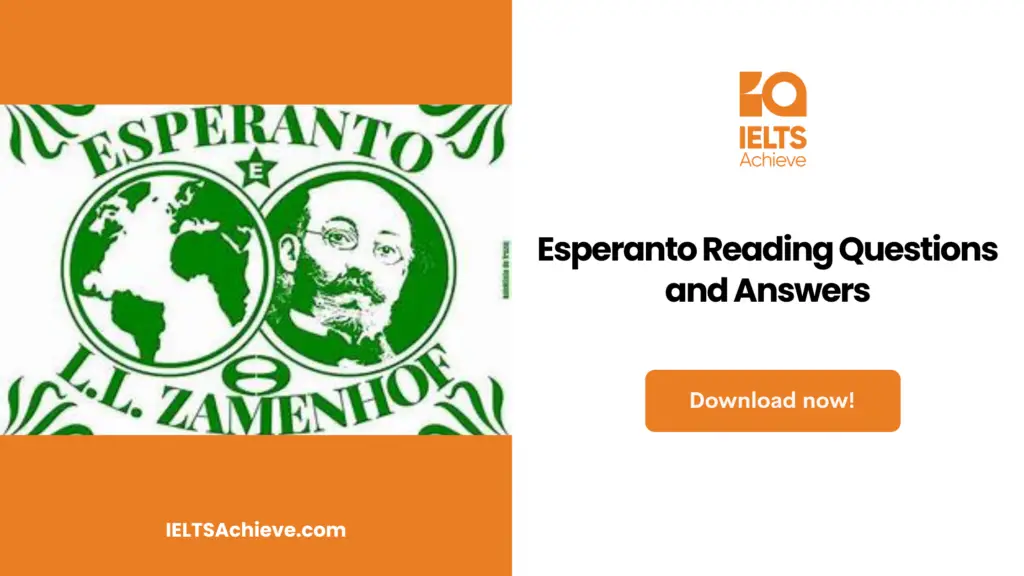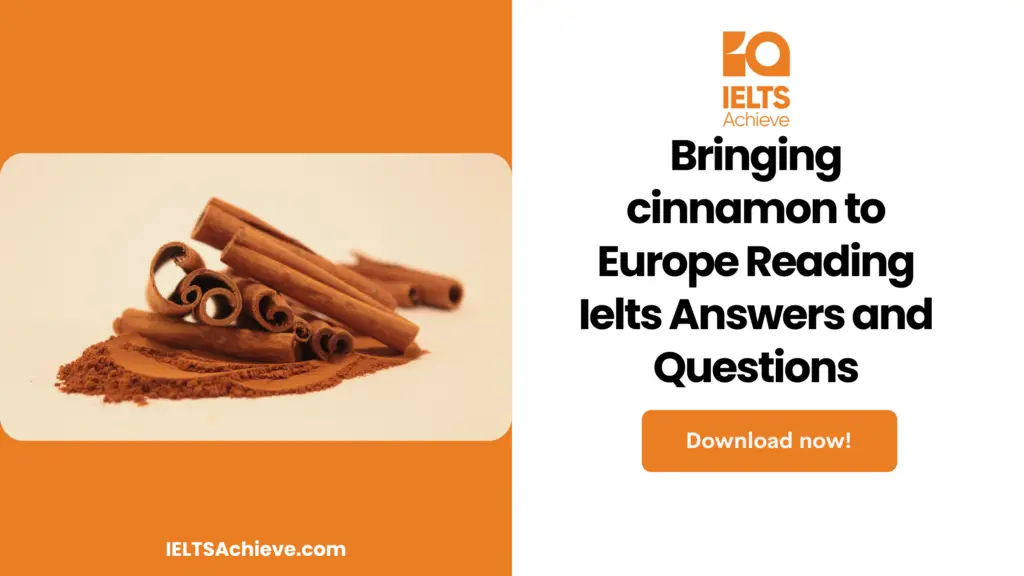The Blog post contains the following IELTS Reading Questions:
- IELTS Reading True/False/Not Given
- IELTS Reading Sentence Completion
- IELTS Reading Multiple Choice Questions
Stay informed and prepared for success – Explore our comprehensive Reading Test Info page to get valuable insights, exam format details, and expert tips for mastering the IELTS Reading section.
IELTS Reading passage – Esperanto

Esperanto
Cu vi paroli Esperanlon? Ne? Can you understand this? Should you be expected to? Depending on who you ask, somewhere from 10,000 to two million people in places all over the world could understand this sentence, and presumably reply in this same language. And it is not one that ever evolved through any natural process. To give it its technical name, it is a ‘constructed auxiliary language’. More specifically, it is ‘Esperanto’, and out of the several attempts throughout modern history to create artificial languages, Esperanto remains the most widely spoken.
‘Widely spoken’ is a relative term here. Compared to any natural language, the number of Esperanto speakers remains pitiably small — a far cry from the high hopes of its inventor, Dr. Ludwig Zamenhof, who was an eye doctor growing up in the racially divided Eastern-European town of Bialystok. In this complex and uneasy mixture of Poles, Jews, Russians, and Germans, each speaking their own language, a high-minded Zamenhof lamented how these languages so obviously categorised the city’s residents into different, and often hostile, groups. He resolved to create an easily learnt and politically neutral language, one that would transcend nationality, ethnicity, race, colour, and creed. It would be a universal second language, and his first book detailing this idea was published in 1887.
Surprisingly perhaps, the concept quickly gained acceptance and a loyal following. It seems that in a linguistically divided Eastern Europe, many people possessed the same idealism which drove Zamenhof. From there, then to the West, then into the Americas and Asia, Esperanto journals, magazines, and clubs, were formed, ultimately leading to the first world congress of Esperanto speakers in France, in 1905. These congresses have been held every year since then, apart from when world wars delayed proceedings. And today, Esperanto is still present, although very much under the radar. Whilst not yet having achieved the status of being an official language of any state or governing body, it is, at least, occasionally taught at schools and educational institutions on an informal or experimental basis.
What actually keeps Esperanto going is the motivation of those who become interested. Language books, journals, and various online and video-based self-learning technologies exist, as well as an active speaking community, but the key question remains: whether it is worth investing the time in acquiring the language. In other words, does it have any innate advantages over other languages or equip its speakers with a useful skill in life? The first question can be promptly answered. Proponents explain that, by being so simple and internally consistent, Esperanto is easy to learn, being able to be mastered in a fraction of the lime needed for any conventional language.
While we may accept that, the second question is far more problematic and raises further issues, the main one being whether the language is even necessary. Would international communication indeed be better if we all spoke Esperanto? Are there not other factors involved? And why cannot the English language take that role (which it virtually has)? Why divert state funds to support what may always remain a marginalised speech community, especially when there exists so many other languages spoken by far more people, and of far greater utility? The answers are emotional, complex, and confusing.
One problem with Esperanto is that it is culturally European. Its vocabulary and internal rules of construction derive from European languages, making it difficult for Asian learners. There is also a large and imposing vocabulary, with many nouns rather idiosyncratically chosen, and a certain unnecessary complexity which Zamenhof (who was not a professional linguist) had not realised. In 1894, he suggested a ‘reformed Esperanto’; however, the Esperanto speakers of that day were loathe to alter a language which they had already mastered, rejecting Zamenhof’s proposals, and also those of a special French committee formed 13 years later to discuss the adoption of a standard international language.
In the meantime, another artificial language had emerged. Called ‘Ido’, it was a product of various academics who embedded the changes that Esperanto was thought to have needed. This new language, sharing the same lofty goals, divided the support base of Esperanto. A large number defected to Ido, which then underwent further changes through committee after committee, and eventually the formation of an independent academy. However, Ido suffered substantial decline when its best-known advocate was killed in a car accident, and with the advent of World War One. After the war, its most vocal proponent published his own constructed language, ‘Novial’, making the schism all too confusing, such that the original Esperanto quickly became the predominant language of its type.
Esperanto may lead the field, but it falls far short of the aim of both its creator and many of its speakers — that of a truly global second language uniting all in mutual understanding. This high-minded goal, almost universally shared in the early days of the language, has mellowed among many followers, who are now content just to have a special language and its culture and community with whom they can interact. The unlikelihood of achieving more than this was even admitted in an Esperanto convention in 1980, although many still cling to the pracelo, the ‘original goal’, of an official status and worldwide use. Will this ever be achieved? All I can say is estus agrable pensas tiel, sed preshau certe ne estos.
Unlock your full potential in the IELTS Reading section – Visit our IELTS Reading Practice Question Answer page now!
Recommended Questions:
Renewable Energy IELTS Reading Question with Answer
Questions 14-17
Do the following statements agree with the information given in Reading Passage Two?
TRUE if the statement agrees with the information
FALSE if the statement contradicts the information
NOT GIVEN If there is no information on this
14. The number of Esperanto speakers is quite large.
15. Zamenhof spoke many languages.
16. Esperanto is easier to learn than other languages.
17. Esperanto World Congresses have been held every year since 1905.
Enhance your skills in identifying information as True, False, or Not Given. Click here to discover expert strategies and techniques for mastering this question type in the IELTS Reading section.
Questions 18-21
Complete the sentences. Choose NO MORE THAN TWO WORDS from the passage for each answer.
The different ethnic groups in Zamenhof s hometown were frequently (18)……………………
The first Esperanto speakers shared Zamenhofs (19)……………………
English now essentially provides the means of (20)……………………..
Official support of Esperanto could be considered a waste of (21)…………………..
Questions 22-26
Answer the questions. Choose the correct letter, E, I, or B.
E Esperanto
I Ido
B Both
Which language
22. had many stages in its development?
23. had its development affected by World War One?
24. has some strange words?
25. was designed by many people?
26. has never achieved its aim?
Ready to improve your performance in Multiple Choice Questions (MCQs)? Click here to access our comprehensive guide on how to tackle MCQs effectively in the IELTS Reading section.
Unlock your full potential in the IELTS Reading section – Visit our IELTS Reading Practice Question Answer page now!
Recommended Questions:
Renewable Energy IELTS Reading Question with Answer

We hope you found this post useful in helping you to study for the IELTS Test. If you have any questions please let us know in the comments below or on the Facebook page.
The best way to keep up to date with posts like this is to like us on Facebook, then follow us on Instagram and Pinterest. If you need help preparing for the IELTS Test, join the IELTS Achieve Academy and see how we can assist you to achieve your desired band score. We offer an essay correction service, mock exams and online courses.

